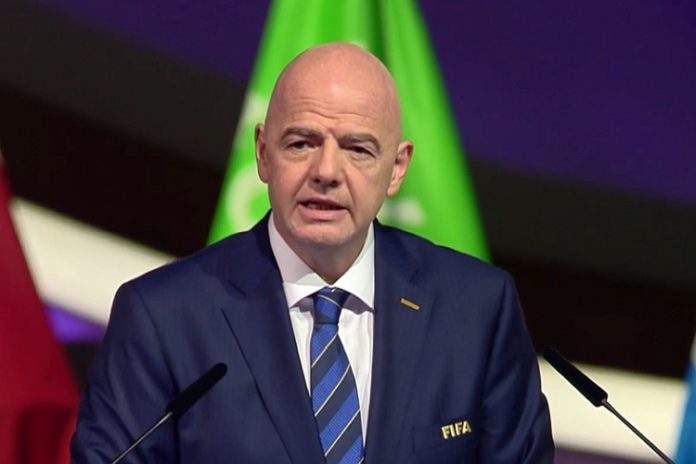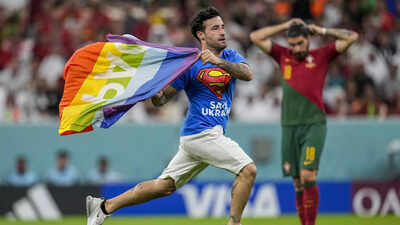
FIFA President Advocates for Russia's Return to International Football
FIFA President Gianni Infantino has ignited a firestorm of controversy with his recent remarks advocating for the return of Russia to the international football fold. Speaking at a congress of the Russian Football Union (RFU) on April 2, 2025, he expressed an optimistic view that peace talks regarding the ongoing conflict in Ukraine could lead to Russia's reintegration into global football. "As talks are going on for peace in Ukraine, I hope we can soon move to the next page – bring back Russia in the football landscape, because this would mean that everything is solved," Infantino stated, echoing sentiments that have both supporters and detractors within the football community.

Infantino's comments reflect a broader perspective held by some factions in football, indicating that the sport should serve as a unifying force rather than a vehicle for division. He emphasized, "That’s what we have to cheer for. That’s what we have to pray for, because that is what football is about. It’s not about dividing." This rhetoric resonates with the ideals of many who believe that sport can transcend political barriers and bring nations together.
Context of Russia's Exclusion
Russia's national football team has faced exclusion from various international competitions following its invasion of Ukraine in 2022. This has led to significant backlash from both footballing bodies and the global community. UEFA and FIFA suspended Russian national teams and clubs from participation in their competitions, including the prestigious UEFA European Championship and the FIFA World Cup qualifiers. This was a direct response to the geopolitical tensions and the implications for international relations.
Despite this, Infantino's vision of reintegration is particularly salient as discussions regarding the future of international relations evolve. The FIFA President's remarks occurred amidst a backdrop of ongoing diplomatic talks aimed at resolving the conflict in Ukraine, raising the question of whether sports can play a role in the healing process.
Mixed Reactions to Infantino's Statements
The suggestion to allow Russia back into international football has triggered a spectrum of reactions. Advocates of reintegration argue that football can be a powerful tool for peace and reconciliation. They view the return of Russia as a step towards normalization and a chance for players to unite through the sport they cherish.
Conversely, critics caution against rushing to reintegrate a nation that has faced widespread condemnation for its actions. Many football personalities and organizations remain firm in their stance that such a move would undermine the principles of fair play and humanitarian values that the sport stands for. They argue that allowing Russia back would set a dangerous precedent and send the wrong message while the conflict remains unresolved.

The Broader Discussion of Geopolitics in Sports
Infantino’s comments have brought the discussion of geopolitics and sports into sharper focus. There is an ongoing debate within football circles about the responsibilities of sports organizations in times of international conflict. Some argue that sports should remain a separate entity from politics, while others believe that taking a stand is essential given the societal implications of nations' actions.
UEFA's national associations director, Zoran Laković, echoed Infantino's belief, stating at the RFU congress: “I hope that this year Russian sport, including the national football team, will finally return to where it was before this situation.” Such statements illustrate a growing sentiment that the desire for inclusivity and unity in football may sometimes overshadow the pressing political realities at play.
Statistics and Trends
Recent statistics indicate that football continues to be one of the most widely followed sports globally, with millions of fans passionately supporting their national teams. FIFA itself reported that the last World Cup attracted over 3.5 billion viewers, illustrating the sport's significant impact on global culture. However, as FIFA gears up for upcoming tournaments, the inclusion of all nations, particularly those under geopolitical scrutiny, becomes a contentious issue.
According to a poll conducted by Inside World Football, approximately 65% of respondents from various countries believe that sports should remain apolitical, while 35% favor a more flexible approach that allows for dialogue through sport. This divide highlights the complexity of navigating international relations within the sporting sphere.
Conclusion
As FIFA and its President push for Russia's reintegration into international football, the implications of such a decision extend far beyond the pitch. Infantino's comments have ignited conversations around the role of sports in politics, the responsibilities of international organizations, and the potential for football to act as a catalyst for peace.
While the prospect of Russia returning to the football landscape remains uncertain, it serves as a critical reminder of the intertwining of sport and global affairs. As debates continue, the football world watches closely to see how these discussions will shape the future of international competitions and the sport that unites so many across the globe.